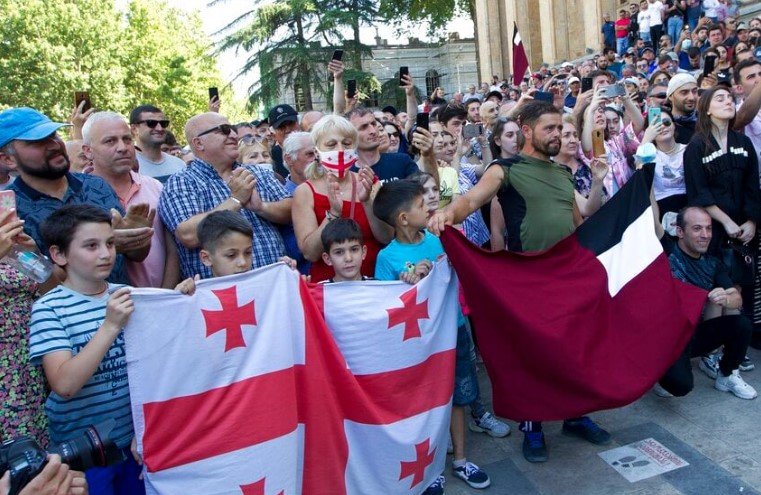Political developments in Georgia, Armenia, and Azerbaijan continue to unfold, capturing regional and global attention. Here’s the latest roundup of news and opinions shaping the South Caucasus.
Georgia Faces Political Turmoil Amid Protests
The political climate in Georgia remains tense following the inauguration of Mikhail Kavelashvili, a president appointed by the ruling “Georgian Dream” party. His rise to office has sparked widespread criticism. Opposition parties, civil society groups, and non-governmental organizations have questioned his legitimacy. Western partners have also refrained from offering congratulations—a stark signal of unease.
Meanwhile, a large rally in support of outgoing President Salome Zourabichvili took place outside the presidential administration building. Although her term officially ended on December 29, Zourabichvili has vowed to remain in office until new parliamentary elections are conducted. Her stance has gained significant backing from opposition groups, protesters, and Western leaders, who are also urging Georgia’s government to hold fresh elections.
The backdrop to this turmoil includes ongoing protests, with hundreds of thousands demanding lawful power transitions and democratic reforms. As unrest persists, Georgia’s European aspirations remain a focal point for both its citizens and international observers.
Restrictions on Rights Spark Outrage
Adding fuel to the fire, Georgia’s parliament—dominated by “Georgian Dream” deputies—has enacted a controversial package of amendments that critics say infringe on human rights. The laws, signed into effect by Kavelashvili on December 29, impose stringent restrictions on public gatherings. Key changes include bans on fireworks, lasers, and masks during protests.

Penalties for violations have been sharply increased, and new criminal offenses have been introduced. Among the most criticized amendments is a rule that exempts the state from reinstating individuals to their jobs even if a court decision is in their favor. Employment processes in state institutions have also been streamlined, raising concerns about potential misuse of power.
International reaction has been swift. Dutch Foreign Minister Kaspar Veldkamp called on Georgia to consider new parliamentary elections in line with OSCE recommendations. He praised Zourabichvili for her leadership and commended the Georgian people for peacefully standing up for their democratic and European ambitions despite intimidation.
Foreign Policy and Diplomatic Discussions
Following his inauguration, Kavelashvili attended a high-profile conference at the Bodbe Hotel in Sighnaghi. The event, which included members of the ruling party, government ministers, and the speaker of parliament, centered on Georgia’s foreign policy objectives.
As the country grapples with internal divisions, its geopolitical stance remains a critical issue. Western leaders continue to monitor Georgia’s path, urging adherence to democratic norms and human rights.
The Broader South Caucasus Landscape
While Georgia’s political turbulence dominates headlines, neighboring Armenia and Azerbaijan remain on edge. The region’s complex relationships and ongoing tensions are shaping policy decisions and public sentiment.
What’s Next?
For Georgia, the stakes are high. Its aspirations for European integration hinge on resolving domestic challenges and upholding democratic principles. The coming weeks will likely see intensified calls for political compromise, both from within and abroad.
Meanwhile, the South Caucasus as a whole continues to navigate its intertwined histories and shared futures, making it a region to watch closely.
